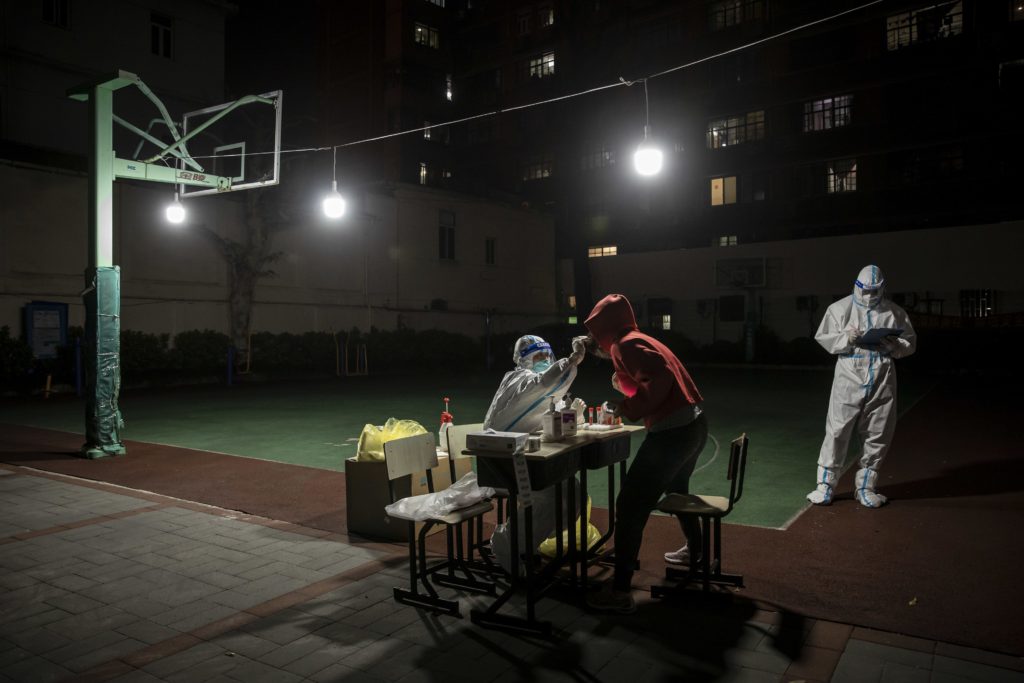(Bloomberg) — China’s largest documented outbreak continues to spread despite an extended lockdown of Shanghai’s 25 million people, weighing on a fragile economy and straining global supply chains.
There were 26,087 new daily infections reported in the Chinese financial hub on Sunday, an all-time high. Residents have been locked down for weeks now, with frustration building among the population as they struggle to get access to food and medical care.
Elsewhere, the southern metropolis of Guangzhou is implementing a series of restrictions after local authorities warned the 20 cases they found in the latter part of last week could be the tip of the iceberg.
Infections and containment measures across China are causing an increasing drag on the world’s second-largest economy, with consequences for global growth, supply chains and inflation.
Shanghai’s struggle with the virus means other local governments may become more sensitive to flare-ups and step up mobility controls even when cases are low, according to Tommy Xie, head of greater China research at Oversea-Chinese Banking Corp.
“The Chinese economy may have to brace for more short-term disruptions in the coming months,” Xie said in a note Monday.
Economists now predict the economy will expand 5% this year, below the official target of around 5.5%. Analysts at Morgan Stanley have cut their growth forecasts this year on the lockdown impact, while Citigroup Inc. has warned of risks to growth in the second quarter.
China’s slowdown is already having a ripple effect across the region. Activity among Hong Kong’s private businesses slumped further into contraction in March, as lockdowns in mainland China weighed on new orders, according to the S&P Global purchasing managers’ index. Taiwan’s exports to China also decelerated in March from February.
Containers are piling up at Shanghai, China’s biggest port, as the lockdown in the city has led to a shortage of trucks to clear imports. It’s also disrupted business operations in the city, with companies like chip giant Semiconductor Manufacturing International Corp. struggling to secure trucks to ship out finished goods.
“China’s worst Covid outbreak may lead to delays and higher prices, which could stall recovery and further add to global inflation,” said Bruce Pang, head of macro and strategy research at China Renaissance Securities Hong Kong Ltd.
The Shanghai Shipping Exchange Shanghai (Export) Containerized Freight Index, a measure of freight rates, has declined to 4,349 on April 1 from a peak of 5,110 in early January. The drop indicates an easing in exports, according to Pang.
In Shanghai, about 95% of the virus cases were among people already under isolation, data from the municipal government shows. The tally has climbed from 9,006 cases on April 3.
The figures have surged despite the city’s move to lock down its population to curb transmission, starting with the eastern part — home to the financial district and numerous industrial parks — on March 28. They were joined by residents in the west on April 1.
Guangzhou has shut schools until April 17 and will conduct mass-testing, while two districts have closed indoor entertainment venues. The city is also requiring people leaving to have a negative nucleic acid test result within 48 hours of departure.
Business disruptions are showing up in various indicators. Factory activity in China fell to its worst level since the pandemic’s onset two years ago in March, according to the Caixin Manufacturing Purchasing Managers’ Index, a private survey focusing on smaller export-oriented businesses. The official PMI also indicated a contraction in both manufacturing and services sectors in March.
Consumption is taking a toll as more residents stay home. Tourism revenue over the Qingming festival, the three-day national holiday last week, declined by 31% from last year to 18.8 billion yuan ($3 billion), according to official data. That’s equivalent to 39% of the pre-pandemic level in 2019, the Ministry of Culture and Tourism said.
Data Monday showed a 10.9% plunge in vehicle sales in March from a year earlier, after a gain of 4.7% in February. The lockdowns have also pushed up vegetable prices, which surged 17.2% on year in March, compared to a drop of 0.1% in February.
(Updates with details on economy starting from first paragraph.)
More stories like this are available on bloomberg.com
©2022 Bloomberg L.P.











